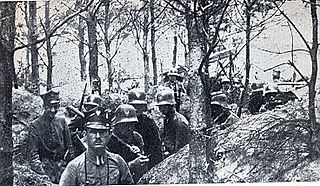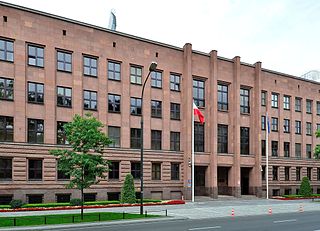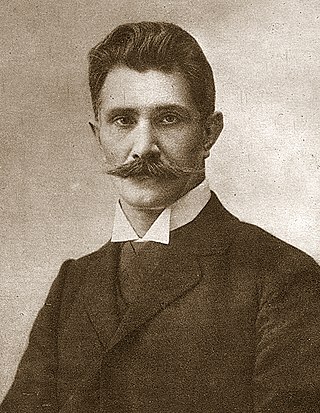The history of Poland spans over a thousand years, from medieval tribes, Christianization and monarchy; through Poland's Golden Age, expansionism and becoming one of the largest European powers; to its collapse and partitions, two world wars, communism, and the restoration of democracy.

Józef Klemens Piłsudski[a] was a Polish statesman who served as the Chief of State (1918–1922) and first Marshal of Poland. In the aftermath of World War I, he became an increasingly dominant figure in Polish politics and exerted significant influence on shaping the country's foreign policy. Piłsudski is viewed as a father of the Second Polish Republic, which was re-established in 1918, 123 years after the final partition of Poland in 1795, and was considered de facto leader (1926–1935) of the Second Republic as the Minister of Military Affairs.
From 1795 to 1918, Poland was split between Prussia, the Habsburg monarchy, and Russia and had no independent existence. In 1795 the third and the last of the three 18th-century partitions of Poland ended the existence of the Polish–Lithuanian Commonwealth. Nevertheless, events both within and outside the Polish lands kept hopes for restoration of Polish independence alive throughout the 19th century. Poland's geopolitical location on the Northern European Lowlands became especially important in a period when its expansionist neighbors, the Kingdom of Prussia and Imperial Russia, involved themselves intensely in European rivalries and alliances as modern nation-states took form over the entire continent.

The Greater Poland uprising of 1918–1919, or Wielkopolska uprising of 1918–1919 or Poznań War was a military insurrection of Poles in the Greater Poland region against German rule. The uprising had a significant effect on the Treaty of Versailles, which granted a reconstituted Second Polish Republic the area won by the Polish insurrectionists. The region had been part of the Kingdom of Poland and then Polish–Lithuanian Commonwealth before the 1793 Second Partition of Poland when it was annexed by the German Kingdom of Prussia. It had also, following the 1806 Greater Poland uprising, been part of the Duchy of Warsaw (1807–1815), a French client state during the Napoleonic Wars.

Roman Stanisław Dmowski was a Polish politician, statesman, and co-founder and chief ideologue of the National Democracy political movement. He saw the Germanization of Polish territories controlled by the German Empire as the major threat to Polish culture and therefore advocated a degree of accommodation with another power that had partitioned Poland, the Russian Empire. He favoured the re-establishment of Polish independence by nonviolent means and supported policies favourable to the Polish middle class. While in Paris during World War I, he was a prominent spokesman for Polish aspirations to the Allies through his Polish National Committee. He was an instrumental figure in the postwar restoration of Poland's independent existence. Throughout most of his life, he was the chief ideological opponent of the Polish military and political leader Józef Piłsudski and of the latter's vision of Poland as a multinational federation against German and Russian imperialism.

National Democracy was a Polish political movement active from the second half of the 19th century under the foreign partitions of the country until the end of the Second Polish Republic. It ceased to exist after the German–Soviet invasion of Poland of 1939.

Ignacy Jan Paderewski was a Polish pianist, composer and statesman who was a spokesman for Polish independence. In 1919, he was the nation's prime minister and foreign minister during which he signed the Treaty of Versailles, which ended World War I.

Wincenty Witos was a Polish statesman, prominent member and leader of the Polish People's Party (PSL), who served three times as the Prime Minister of Poland in the 1920s.

The Ministry of Foreign Affairs is the Polish government department tasked with maintaining Poland's international relations and coordinating its participation in international and regional supra-national political organisations such as the European Union and United Nations. The head of the ministry holds a place in the Council of Ministers.

The Blue Army, or Haller's Army, was a Polish military contingent created in France during the latter stages of World War I. The name came from the French-issued blue military uniforms worn by the soldiers. The symbolic term used to describe the troops was subsequently adopted by General Józef Haller von Hallenburg to represent all newly organized Polish Legions fighting in western Europe.

Ignacy Ewaryst Daszyński was a Polish socialist politician, journalist, and very briefly Prime Minister of the Second Polish Republic's first government, formed in Lublin in 1918.
The Union of Active Struggle, also translated as Union for Active Struggle and Union for Active Resistance, was a Polish secret military organization founded in June 1908 in Lwów by Józef Piłsudski, Marian Kukiel, Kazimierz Sosnkowski and Władysław Sikorski, all members of the Combat Organization of the Polish Socialist Party in the Kingdom of Poland.

The National Party was a Polish nationalist political party formed on 7 October 1928 after the transformation of the Popular National Union.

Stanisław Głąbiński was a Polish politician, academic, lawyer and writer.

Zygmunt Balicki was a Polish sociologist, publicist and one of the first leading thinkers of the modern Polish nationalism in the late 19th century under the foreign Partitions of Poland. Balicki developed his original political thought inspired by the ideals of Aleksander Świętochowski from the movement of Positivism which was marked by the attempts at trying to stop the wholesale Russification and Germanization of the Poles ever since the Polish language was banned in reprisal for the January Uprising. Balicki was a key protagonist in the National Democratic campaign of antisemitic agitation.

Little Treaty of Versailles or the Polish Minority Treaty was one of the bilateral Minority Treaties signed between minor powers and the League of Nations in the aftermath of the First World War. The Polish treaty was signed on 28 June 1919, the same day as the main Treaty of Versailles was signed, which is the reason for one of its names. It was the first of the Minority Treaties and served as a template for the subsequent ones.
The Polish National Department was a major organization of Polish-American Polish diaspora in United States around and after World War I. Originally the Polish Central Relief Committee and based in Chicago, it organized relief for war-torn and newly independent Second Polish Republic. Prominent activists included world-famous pianist and future prime minister of Poland, Ignacy Jan Paderewski and former Illinois Treasurer John F. Smulski.

While Poland did not exist as an independent state during World War I, its geographical position between the fighting powers meant that much fighting and horrific human and material losses occurred on the Polish lands between 1914 and 1918.
Polish National Committee was formed in Russian partition during World War I, and grouped Polish politicians who wanted to advance the Polish cause by supporting Russia in World War I. The Committee was recognized by the Entente, and was primarily opposed to Polish factions supporting the Central Powers.

Helena Maria Paderewska was a Polish social activist who helped found the Polish White Cross society during World War I, and also is known as the second wife and partial biographer of Polish patriot, prime minister and musician Ignacy Jan Paderewski.













